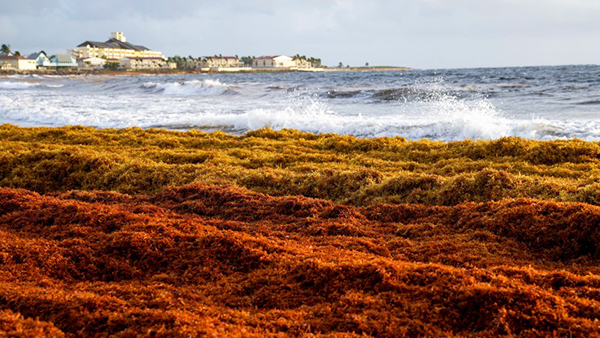
Sargassum Seaweed Covers Frigate Bay Beach
St. Kitts and Nevis is actively supporting regional efforts to address the ongoing influx of Sargassum seaweed affecting beaches across the Caribbean. This initiative was highlighted by Larry Vaughan, the St. Kitts and Nevis Ambassador to the Caribbean Community (CARICOM), during his address at the Association of Caribbean States (ACS) Summit held in Guatemala.
Vaughan emphasized the urgency of finding a solution to the sargassum issue, noting its adverse effects on both tourism and the livelihoods of local fishermen. “The presence of seaweed creates a negative experience for visitors and threatens the livelihoods of our small-scale fishermen. St. Kitts and Nevis is committed to supporting sustainable solutions to this problem,” he stated. The ambassador underscored the importance of collaborative efforts and welcomed innovative strategies to mitigate the issue. “We welcome early warning systems and any further innovative efforts to harvest and utilize seaweed for sustainable economic activities,” he added.
The sargassum seaweed problem is not confined to St. Kitts and Nevis alone. A large plume of seaweed is currently affecting coastlines throughout the Caribbean, Central America, and the southern United States. The seaweed invasion has raised significant environmental and health concerns. One of the primary dangers posed by the decaying sargassum is the emission of harmful gases, such as hydrogen sulfide and ammonia fumes. These emissions can have detrimental effects on both human health and the environment.
Efforts to manage the seaweed influx are multifaceted, involving both immediate and long-term strategies. Early warning systems aim to predict and track the movement of sargassum blooms, allowing for timely responses. Additionally, there is a growing interest in exploring sustainable ways to harvest and repurpose sargassum. Potential uses include converting it into bio-fuel (#ad), fertilizer, or other commercially viable products, which could provide economic benefits to affected communities.
St. Kitts and Nevis’ commitment to tackling the seaweed issue reflects a broader regional initiative to find sustainable and innovative solutions. By working together with neighboring countries and international organizations, the nation hopes to mitigate the impact of seawwed and protect its tourism industry and local livelihoods.